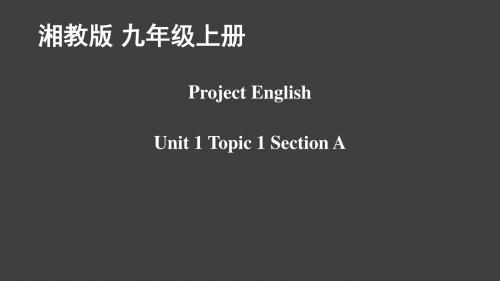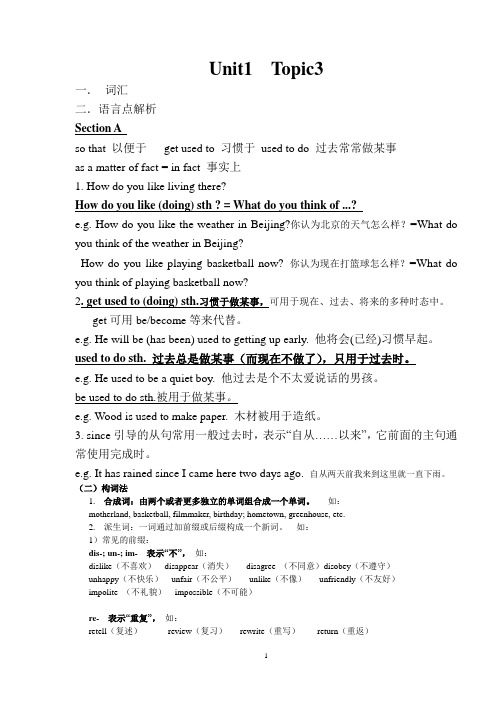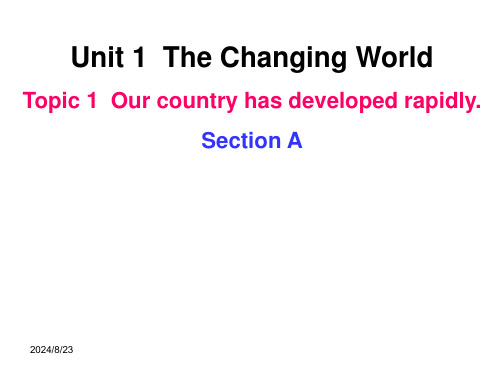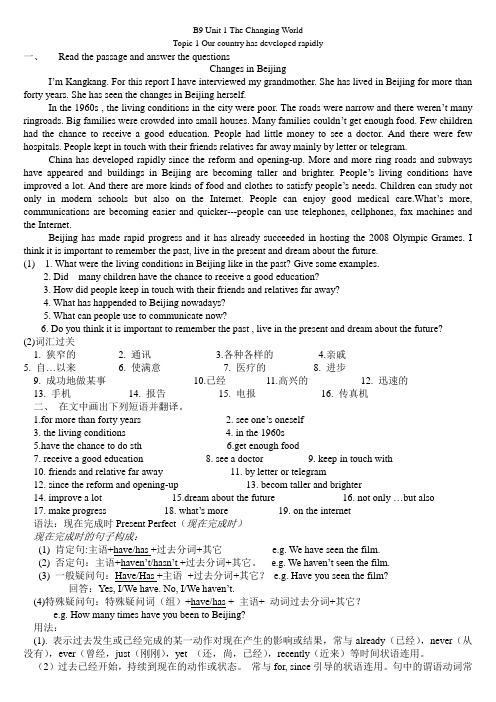仁爱英语九年级上Unit1课件
Unit2+Topic+1+课文详解课件2023-2024学年仁爱版九年级英语上册

A. too many
B. too much
C. much too
D. too
( B ) 2. — Don’t smoke. It’s ________ to our health.
— Sorry, I won’t do it again.
A. harm
B. harmful
C. harms
D. harmed
( C ) 3. He has a headache. He feels difficult ________.
A. breathe
B. breath
C. to breathe
D. to breath
单项选择
( C ) 4. She is so noisy that I can’t ________ her.
bees and butterflies dancing.
butterfly n.蝴蝶 see sb. doing sth.看见某人正在做某事 see sb. do sth.看见某人经常在做某事
• Kangkang: Everything has changed.
一切都变了。
• Michael: Do you want to have a picnic here?
Unit2 Topic 1
点击此处输入副标题
Section A
Section A
正在计划
• (Kangkang, Jane, Maria and Michael are planning a picnic for Sunday.)
• Jane and Maria: Kangkang, where shall we go? 野餐
我总是心情很差。
仁爱英语九年级上册第一单元Topic 1SectionA(共30张PPT)

Jane
Kangkang
an English summer school
Maria
Place
India
Mount Huang
Cuba
Name
Rita
Jane Mount Huang
Kangkang
Maria
Plcae
India
an English summer school
Cuba
Maria has gone to Cuba. Kangkang been an to English summer Rita Jane hasto been been to Mount India. Huang. school. Example: has
hometown has become her _________ more and more _________ beautiful it is beautiful but there were people too many _______ to improve _______ his English and she will be back tomorrow ________
Jane
Kangkang
Maria
Cuba to be a _____ volunteer
1. What did Rita do in her hometown? 2. How does she feel about her hometown? 3. Why couldn't Jane take photos in Mount
Maria:
Have you seen her this morning?
Michael: Oh, she _________ has gone to the library. Maria: I will go and find her. By the way, where is Kangkang? Michael: He _________ has gone to the library, too. Let’s go and find them.
仁爱英语九年级上U1T1语言点详解

Unit1 Topic3一.词汇二.语言点解析Section Aso that 以便于get used to 习惯于used to do 过去常常做某事as a matter of fact = in fact 事实上1. How do you like living there?How do you like (doing) sth ? = What do you think of ...?e.g. How do you like the weather in Beijing?你认为北京的天气怎么样?=What do you think of the weather in Beijing?How do you like playing basketball now? 你认为现在打篮球怎么样?=What do you think of playing basketball now?2. get used to (doing) sth.习惯于做某事,可用于现在、过去、将来的多种时态中。
get可用be/become等来代替。
e.g. He will be (has been) used to getting up early. 他将会(已经)习惯早起。
used to do sth. 过去总是做某事(而现在不做了),只用于过去时。
e.g. He used to be a quiet boy. 他过去是个不太爱说话的男孩。
be used to do sth.被用于做某事。
e.g. Wood is used to make paper. 木材被用于造纸。
3. since引导的从句常用一般过去时,表示“自从……以来”,它前面的主句通常使用完成时。
e.g. It has rained since I came here two days ago. 自从两天前我来到这里就一直下雨。
(二)构词法1.合成词:由两个或者更多独立的单词组合成一个单词。
仁爱英语九年级上册Unit1Topic1详细解读(共26张PPT)

“公共汽车来了。” (完全倒装) _H__e_re__h_e_c_o_m__e_s. “他来了。” (局部倒装)
3. Though I had no time to travel, I still felt very happy. 意思是“尽管我没时间去旅游,但我仍然感到很
Section B 1. 从……当中学习___l_e_a_rn_…__f_r_o_m_…____________ 2. 没有时间做某事___h_a_v_e_n_o__t_im__e_t_o_d_o__st_h_.____ 3. 表演有趣的节目_p_u_t _o_n_f_u_n_n_y_/i_n_t_er_e_s_ti_n_g_s_h_o_w__s 4. 一群老年人 _______a_g_r_o_u_p_o_f_o_l_d_p_e_o_p_l_e______ 5. 一些有意义的事___s_o_m__et_h_i_n_g_m__ea_n_i_n_g_f_u_l ____ 6. 上网聊天 _________c_h_a_t _o_n_li_n_e______________ 7. 跳绳 _____________ju_m__p_r_o_p_e_______________
Section D 1. (在……)发挥重要作用
____p_l_a_y_a_n__im__p_o_r_ta_n_t_p_a_r_t/_ro_l_e_(_i_n_.._.)___ 2. 下棋___________p_l_a_y_c_h_e_s_s___________ 3. 在某人空闲时间__in__o_n_e’_s_s_p_a_r_e/_f_re_e__ti_m_e_ 4. ……和……都___b_o_t_h__…__an_d_…__________ 5. 近几年_________i_n__re_c_e_n_t_y_e_a_rs________ 6. 出国旅游_______m__a_k_e_a__to_u_r_a_b_r_o_a_d____
九年级英语上册-仁爱版.课件

第七页,共13页。
Kangkang :
… When he was a child, most families in the country had at least three or four children. At that time, China was the country with the largest population in the
第六页,共13页。
3a Listen, read and say
Maria: Oh, Kangkang. What a nice photo! You looked so cute !
Kangkang: Yes, everybody loved me so much!
Maria: But the family in the other photo is very big. It seems that their living conditions were not very good.
really hate to go shopping. Maria: So do I.
第四页,共13页。
2 Work alone
• Answer the following questions according to 1a
1. Where has kangkang just been ?
2.What happened to kangkang and Michael ?
1. I've just tried to call you. 2.Have you found him yet? 3.He has already gone home.
仁爱版 初三英语九年级上册Unit1 Topic1PPT课件

Topic 1 Our country has developed rapidly. Section A
2024/8/23
2024/8/23
2024/8/23
• have/has been to…去过。。。 • He has been to Hubei. • 他去过了湖北 (人已经不在湖北) • I have been to Beijing. • 我去过了北京。(人已经不在北京) • have/has gone to... • 已经去了,它强调主语此时不在说话地点。 • e.g. She has gone to Hubei. • 她已经去了湖北。(人已经不在说话地点) • She has gone to Beijing. • 他已经去了北京。 (人已经不在说话地点)
2024/8/23
p124
2024/8/23
Find the sentences with Present Perfect Tense in Section A. Read them aloud.
You have just come back from your hometown.
Great changes have taken place there and my hometown has become more and more beautiful.
2024/8/23
2a TLhisetennetoxtthedcaoyn,vMerasartiiaoncaanmd feillbinatchke .blSanhkes.mTheetn practice it withMyoicurhpaaertlneirn. the school.
Unit1+Topic+3+课文详解课件2023-2024学年仁爱版九年级英语上册

Section B
• Maria: What are you reading, Jane? be动词+V.ing (现在进行时)
• Jane: I’m reading a newspaper from Canada. Martin showed me an interesting article.
街区
事实上=in fact
wonderful place to live. Near our block, there are beautiful parks, good schools,
famous museums and excellent restaurants. And you can go to plays, concerts and
Lesson Three
Topic3 A-B
Words and passages
单词认读
背诵词汇
背诵词汇
词汇 1. with the money 2. so that 3. so...that... 4. in fact/as a matter of fact 5. come for a visit 6. in need 7. decide on sth. 8. provide sth. for sb./provide sb. with sth. 9. feel good about... 10. lend sth. to sb/lend sb. sth.
It is about a program that helps homeless people. show sb.sth.= show sth. to sb.
定语从句:从句充当形容词,修饰前面的program
给某人展示某物
仁爱版九年级英语上册 Unit 1 Topic 2 Section D 课件(共25张PPT)

例如:
1.Jane is cute, →So( )Maria. 2.Jane can swim. →So( )Maria. 3.Jane will swim. →So( )Maria. 4.Jane went swimming. →So( )Maria. 5.Jane often goes swimming. →So( )Maria. 6.Jane has been a swimmer for six years. . →So( )the twins.
* Neither / Nor + be/情态动词/助动词+主语 (全部倒装)
=含有either的否定句,表示上句所谈到的否定情 况也适合于另一主语
1.Jane isn’t cute, → Neither / Nor ( )Maria. 2.Jane can’t swim. → Neither / Nor ( )Maria. 3.Jane won’t swim. → Neither / Nor ( )Maria. 4.Jane didn’t go swimming. → Neither / Nor ( )Maria. 5.Jane doesn’t often go swimming. → Neither / Nor ( )Maria. 6.Jane hasn’t been a swimmer for six years. . → Neither / Nor ( )the twins.
Read through Sections A-C and fill in the blanks with the correct words.
I really _h_a_t_e___ going to a place like that.
仁爱英语九年级上第一单元课文

Rita: Is that so? Can you describe it in detail?
Kangkang: Of course. In the past, many families were big and poor. Parents couldn’t afford education for their children. Most children had no chance to go to school. What’s more, some of them had to work and make money to help support their families. Life was very hard for these child laborers.
Sally: Yes. What about you?
Kangkang: Not bad. Rita, you have just come back from your hometown. How was your trip?
Rita: I went to many places near my home inIndia. In one place I saw children working for a cruel boss. I felt sorry for them. Where have you been, Jane?
SectionB
1aListen, read and say
Rita: Kangkang, I’d like to write an article about teenagers around the world. Could you please tell me something about Chinese teenagers?
仁爱英语九年级上册语法精讲

1.现在完成时的用法:表示过去某一时间发生的动作或存在的状态,对现在仍有影响。
e.g. I have just posted the letter. 我刚把信邮寄了。
She has lost her watch. 她弄丢了手表。
2.现在完成时可以和不明确指出时间的状语连用,如already, yet,just,before, ever, lately, once等。
e.g. Have you heard from your friend lately?你最近收到你朋友的来信了吗?3.现在完成时也可以和包括现在在内的时间状语连用。
如this week, thismorning, today, thisyear等。
e.g. They have moved three times this year. 今年他们已经搬了三次家。
4.现在完成时不能和明确表示过去时间的状语连用。
如yesterday, last week, in 1999, two days ago,just now, when I came in等。
Unit 1-topic3现在完成时(Ⅲ)1.现在完成时表示从过去某一时刻延续到现在的动作或状态,常与for,since引导的状语连用。
for+一段时间,since+过去时间点或从句(从句的谓语动词用过去式)。
e.g. I have lived here for twenty years.我住在这里已有20年了。
We have built many factories since 1985.自1985年以来,我们建了许多工厂。
He has always helped me with my English since he came here.自从他到这里以后,他总是帮助我学习英语。
2.有的动词所表示的动作不是瞬间就可以完成的,要持续一段时间,这样的动词叫延续性动词。
不能延续下去的动词,叫非延续性动词或瞬间动词。
仁爱版九年级英语上册 Unit 1 Topic 3 Section B 课件(共21张PPT)

Read 1a and fill in the blanks .
There is a wonderful program that helps
_h_o_m_e_l_e_ss___people in Canada. The program n o t o n l y _ _ _p_r_o_v_id_e_s_ enough f o o d ,
training, immediately, secretary, helper, club, engineer, wound 2. Some phrases:offer sb sth; provide … with… 3. Some sentences : (1) Well, once they find people in need, they decide on suitable ways to offer them help. (2)The program also provides them with job training so that they can find jobs again.
Fill in the blanks. 1. His father ___d_i_e_d__ (die) in 1992.
His father __h_a_s__b_e_e_n__d_e_a_d__ (be dead) for many years.
2. He ___le_f_t___ (leave) the army because of a leg wound. He _h_a__s_b_e_e__n_a_w__a_y__fr_o_m__ (be away from) the army for seven years because of a leg wound.
仁爱版九年级英语上册 Unit 1 Topic 2 Section B 课件(共27张PPT)

•
1,000,000,000
billion million thousand
973 nine hundred and seventy-three 3 980 three thousand , nine hundred and eighty 98 721 ninety-eight thousand , seven hundred and twentyone 768 540 seven hundred and sixty-eight thousand , five hundred and forty
300 000. 这个城市的人口将近三十万。
强调人口的具体分布或构成 (作复数) e.g. 80% of the population in China are
farmers. 中国百分之八十的人口是农民。
The population of our school __i_s__ (be) 3000. 50% of the population in our school ___a_re__ (be) female.
two thousand and eight Olympic Games
thousands of people
two point two six (2.26) meters tall
3.14 three point one four
100 one hundred 1,000 one thousand
三.修饰人口的词:
The population of China is_la_r_g_e_/_b_i_g. The population of Canada is _s_m__a_ll___.
四.population的用法:
仁爱版九年级英语上册-Unit-1-Topic-3-Section-A-课件

A 课件
2024/2/4
Learning objectives:
1.Listen and try to get some information about New York. 2.Make sentences with “ for ” and “ since ” using the Present Perfect
1.How does Bob like living in New York?
2H.WehtahtidnidksHeiltenishegarreaabto.uHt NeewreYaolrlky loves it.
in the past?
3S.Dhied HheeleanrdliktehliavitntghineNloewcaYol rtkrainffthice pwaasts? terrible and almost evWehryyoornwehydnroot?ve too fast. She also heard the streets were dirty.
Like this:
Broadway is a street in New York.
It … be dirty. But it … since the 1920s. There are many famous … along the street. Every year millions of visitors come to enjoy … music and dance.
When
We
be in Wuhan
2011
He
keep this book
two hours ago
九年级仁爱英语Unit 1 T1 The Changing World

B9 Unit 1 The Changing WorldTopic 1 Our country has developed rapidly一、Read the passage and answer the questionsChanges in BeijingI’m Kangkang. For this report I have interviewed my grandmother. She has lived in Beijing for more than forty years. She has seen the changes in Beijing herself.In the 1960s , the living conditions in the city were poor. The roads were narrow and there weren’t many ringroads. Big families were crowded into small houses. Many families couldn’t get enough food. Few children had the chance to receive a good education. People had little money to see a doctor. And there were few hospitals. People kept in touch with their friends relatives far away mainly by letter or telegram.China has developed rapidly since the reform and opening-up. More and more ring roads and subways have appeared and buildings in Beijing are becoming taller and brighter. People’s living conditions have improved a lot. And there are more kinds of food and clothes to satisfy people’s needs. Children can study not only in modern schools but also on the Internet. People can enjoy good medical care.What’s more, communications are becoming easier and quicker---people can use telephones, cellphones, fax machines and the Internet.Beijing has made rapid progress and it has already succeeded in hosting the 2008 Olympic Grames. I think it is important to remember the past, live in the present and dream about the future.(1) 1. What were the living conditions in Beijing like in the past? Give some examples.2. Did many children have the chance to receive a good education?3. How did people keep in touch with their friends and relatives far away?4. What has happended to Beijing nowadays?5. What can people use to communicate now?6. Do you think it is important to remember the past , live in the present and dream about the future?(2)词汇过关1. 狭窄的________2. 通讯_____________3.各种各样的_________4.亲戚_________5. 自…以来________6. 使满意____________7. 医疗的_________8. 进步___________9. 成功地做某事_________________ 10.已经________11.高兴的__________ 12. 迅速的_________13. 手机___________ 14. 报告__________ 15. 电报___________ 16. 传真机____________二、在文中画出下列短语并翻译。
仁爱科普版英语九年级上Unit 1-课件

Task 2: Reading
To improve your reading skills and learn something useful to help you write.
1. Fast-reading: Read 1 and Mark T (true) or F (false).
( ) 1. Sue lives in Beijing. ( ) 2. Fairmont has a population of fewer than 600 people. ( ) 3. The people in Fairmont often see friends because they live close to each other. ( ) 4. There are many fine places to go to in Beijing. ( ) 5. Li Ming doesn’t like Beijing.
常用的副词:every, never, yet, just, already
• I like living in cities. The transportation here is excellent, so it’s easy to see my friends. I can find many fine and interesting places to visit. In a word, I’m happy here.
huge
• Adjective: • extremely large in size
or amount; great in degree • very successful
market • Noun: • an occasion when people buy and sell goods; the open area or building where they meet to do this
仁爱版英语九年级复习课件:九年级 Unit 1 Topic 1

1./bel/
bell
2./æfrɪkə/
Africa
3./ʃʌt/
shut
4./evə(r)/
ever
5./rəʊp/
rope
6./kə mjuːnɪkeɪʃn/ communication
7./rɪpɔː(r)t/ 8./relətɪv/ 9./sɪns/ 10./sætɪsfaɪ/ 11./medɪkl/ 12./məʃiːn/ 13./ræpɪd/ 14./prəʊɡres/ 15./ɔːlredi/ 16./haɪd/ 17./tʃes/
6. A lot of people love both to play and to watch team sports like basketball or football.
2. There goes the bell.= That’s the bell. = The bell is ringing.
意思是“上课铃响了。” 此句是倒装语序。以here或者there开头时,主语 是名词时完全倒装;但主语是代词时一般不用倒装。 e. g. ⑴__T_h_e_re__c_o_m_e_s_t_h_e_b_u_s_. “公共汽车来了。”
the changes in .
7.我i认n 为记住过去、立足现在、展望未来非常重要。
I think it is important toremember the past ,
仁爱版九年级英语上册Unit1_Topic2_SectionB_优质课课件(共20张PPT)

1. the world 2. China
3. India
4. the USA
A. 309 million B. 6.8 billion C. 1.3 billion D. 1.1 billion
Make similar conversations after the example.
Example: A.: What’s the population of the world? B: It’s about 6.8 billion.
= The world has a population of 6.8 billion.
80 80 80
6800
The population is increasing by 80 million every year.
What a large population!
1b Listen to 1a and match the information.
1a Listen,look and say.
提示:点击图片即可观看动画
So it is. 确实如此。
SSooSsoshheiet dihsoa.ess..
SThhLeeuchsyauspdeacrnlmecaenrsekdet is vtvehereryyrcowroeomlwl.ded.
So +主语+ be/情态动词/助动词
population
表示整体人口(作单数)
e.g. The population of this city is nearly 300 000. 这个城市的人口将近三十万。
BACK
表示部分人口(作复数)
e.g. 80% of the population in Chinaare farmers. 中国百分之八十的人口是农民。
仁爱英语九年级上册课件 Unit 1 Topic 1 section B

awake---_________---__________ be---_____________---__________ bear---___________---__________ beat---___________---__________ become---________---__________ begin---_________---__________ bet---___________---__________ blow---__________---__________ break---_________---__________ bring---_________---__________ build---_________---__________ burn---_________---__________
。 1. _H_a_v_e__ you ever __fe_d___ (feed) disabled children? 2. Our English teacher __c_a_m_e_ (come) back just now. 3. My uncle _h_a_s___ (live) in Shanghai for more than twenty years.lived
There goes the bell What a wonderful experience. Though I had no time to travel, I still felt very happy. To help others makes us happy. I think it is important to remember the past live in the present and dream about the future.
- 1、下载文档前请自行甄别文档内容的完整性,平台不提供额外的编辑、内容补充、找答案等附加服务。
- 2、"仅部分预览"的文档,不可在线预览部分如存在完整性等问题,可反馈申请退款(可完整预览的文档不适用该条件!)。
- 3、如文档侵犯您的权益,请联系客服反馈,我们会尽快为您处理(人工客服工作时间:9:00-18:30)。
(2)yet 用于否定句或疑问句,“还” ,用于句末。在现在完成时的 用法中,肯定句常用already,改用否定句和一般疑问句时常把 already改为 yet(放句末)。 I have already found him. Have you found him yet ? (3)Just位于谓语动词前。 “刚刚” (也可以用于一般现在时,过 去 . 时态) He has just come back from France. (4) ever 多用与一般疑问句,否定句和条件状语从句中,“曾经” Have you ever been to France? No, I haven’t. /Yes,I have. If you ever happen to come here ,be sure to visit us. (5)never 多用于否定的陈述句中,“从不……” (反义词是ever) I have never travelled on a plane.(变成一般疑问句) Have you ever travelled on a plane? He is never late for school. (它还可以用于其他时态中) (6)before 做副词时,”从前“ ,句中谓语常用现在完成时和过去 时。 I have never been to the place before. I saw her before.
三.词组。 consider doing sth. 1.考虑做某事 2.多亏了…… thanks to +名词/doing sth. 3.亲眼看见 see sth.oneself 4.真的么? Is that so? /Really ? have / live a hard life 5.过上艰苦的生活 6.有一个好机会做某事 have a good chance to do sth. 7.与某人联系 keep in touch with… relatives far away 8.远方亲戚 9.在某方面取的进步 make (great) progress in +名词 10.成功做成某事 succeed in doing sth./ be successful in doing sth. 11.现在北京的路发生了什么变化? What has happened to Beijing’s roads nowadays?
(14)在农场动物的帮助下种庄稼
plant crops with the help of farm animals
六,对话P9 1a 七,作业。
(1)背U1Topic3的单词 (2)记今天的笔记中的内容。
U1Topic3
一,一般过去时常用的时间是:last+时间, 段的时间+ago, yesterday, the day before yesterday 例如:He visited his parents yesterday. 二,现在完成时的“未完成”用法。 本用法表示动作或状态从过去某时开始,延续至今,可能结束, 也可能继续下去。常与for短语,since 短语或since从句连用,可以 用how long提问。谓语动词用延续性动词。 1,一般过去时的句子改为现在完成时的句子。 短暂性动词→延续性动词 borrow → keep become → be die → be dead open → be open buy → have close → be closed join → be a member of/be in marry → be married begin/start → be on fall ill → be ill come to → be in/at get up → be up leave /go → be away (from) end → be over
U1Topic2
一.So do I . (前面提到的肯定情况同样适合另外一个主语。“我也 是这样”) Neither/Nor do I.(前面提到的否定情况同样适合于另外一个主语。 “我也不这样”) am ⑴-Tom is a kind man. -So____I. should -The children should come earlier. -So______they. -Kangkang plays football well. -So______we. do -They visited the farm. -So______he. did has -I have been to Beijing. -So______he. will -Mike will leave here. -So______Maria. am ⑵-She isn’t a good worker. -Neither /Nor_____I. -He won’t go swimming. -Neither ______we. will -They have never been to Fuzhou. -Neither______he. has can -We can’t go to the cinema. -Neither ______they.
五,数字表达法.(P 12 2a.) 六,词组。 (1)population “人口”,用 large/small 形容,做主语时,谓语动 词用单数,疑问词用what提问。 What is the population of the U.S.A.? It is 296 million. (2) 对某事严格 be strict in/about sth. 对某人严格 be strict with sb. (3)发展中国家 the developing country 短缺 be short of (4)发达国家 the developed country (5)增加了…. increase by… (6)到目前为止 so far (7)采取许多措施做某事 take many measures to do sth. (8)在做某事方面有奏效 work well in doing sth. (9)属于 belong to (10)一对,一些 a couple of (11)发展迅速 develop quickly (12)快速提高 improve rapidly (13)执行独生子女政策 carry out the one-child policy
U1Topic1 主语+have/has been to + 地点 “去过某地”(已返回) 1 主语+have/has gone to +地点 “去了某地” (未回来) 主语+have/has been in +地点+for +段时间 (待在某地 ,动作可以延长一段时间,后面常接段的时间) She has been in Japan for 2 year. She has been to Japan. She has gone to Japan. ▲地点是名词须接to ,如果地点是副词则不接to。 Tom has been there. ▲对地点提问用:where (书上第二页 2, ⑴⑷ ) ▲对话:P2 1c
二,合成词。(书上P18 3) 三,词组。 decide on +名词 决定某事 决定做某事 decide to do sth. once 一旦…就… 吸毒 take drugs 力求做某事 aim to do sth. 把学校带进穷地区 bring schools into poor areas 在国内外 at home and abroad come for a visit 来参观 提供某人某物 provide sb.with sth. = provide sth.for sb. 自我感觉良好 feel good about oneself 事实上 as a matter of fact = in fact 如果你来了就将很快习惯它的 You will get used to it very soon if you come. 住在那儿你觉得怎么样? 很好。 How do you like living there? It’s great.
put on→ wear fall asleep→ be asleep catch a cold→ have a cold 2,一般过去时的时间→现在完成时的时间 at 8:00 → since 8:00 last year→ for one year /since last year yesterday → for one day /since yesterday two days ago→ for two days /since two days ago 3,一般时的句子变成现在完成时的句子。 (1)He bought the VCD yesterday. He has had the VCD since yesterday./for one day. (2)She borrowed this book three days ago. She has kept this book for three days ./since three days ago. (3)He left the park at 8:00. He has been away from the park since 8 o’clock. 4,书上P20 2b (表格及笔记动词) ,P17 1c
二,So it is. “的确如此“(表达两者对同一事物看法一致) so + 主语(代词)+ be/助动词/情态动词 she was -The girl was at home. -So________. -Lucy came to the school. -So________. she did -Kangkang has been to Beijing. -So_________. he has 三,分数,百分数 ⑴分数,分子用基数词,分母用序数词,分子大于1,分母用复数 形式。例如: one third 1/3, two thirds 2/3, a quarter1/4, three quarters3/4 , a half/one half ½ (2)分数+ of +复数名词:Three fifths of students are girls. Three fifths of the population is Chinese. (3)百分数。”基数词+percent” thirty percent 30% (4)百分数+of +复数名词: China has 20 percent of the world’s population. 四,unless的用法(=if……not…..)”除非…..“(引导条件状语从句.) You will miss the bus unless you hurry up.
